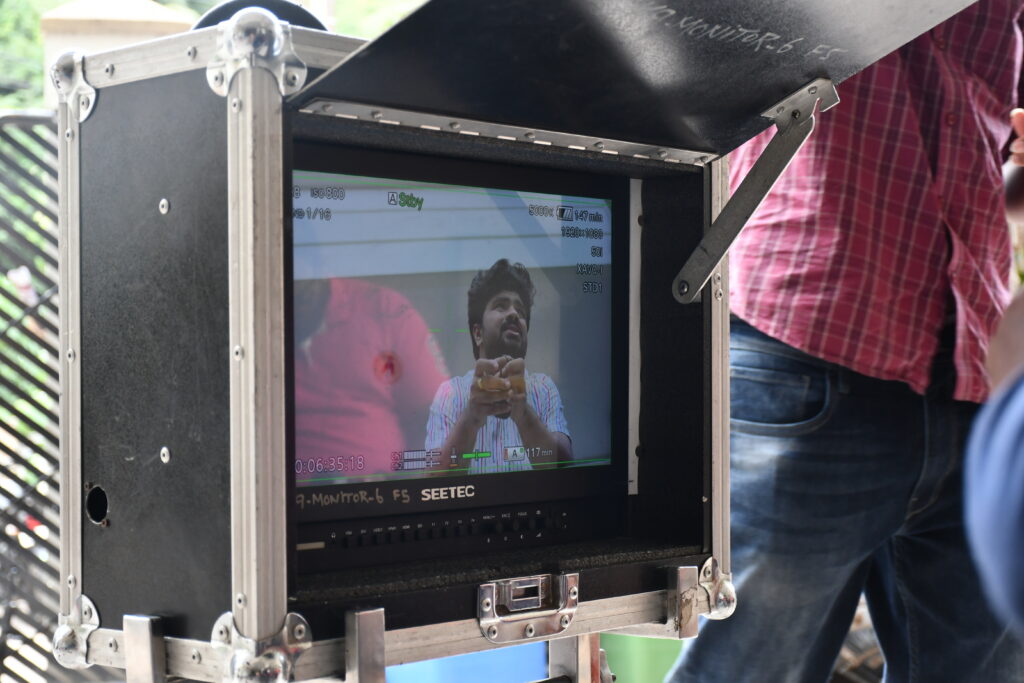"Crafting Cinematic Vision:
Master the Art of Film Direction"

Apply Now
ONE YEAR
2 Semesters, each semester is 6 Months. College timings – 10am to 4pm 5days a week.
FIRST SEMESTER
- Film Appreciation.
- Introduction to World Cinema.
- History of Indian/World Cinema.
- Basics of Cinematography -1.
- Basics of Editing -1.
- Basics of Script Writing.
- Story Board Designing.
- Visualization.
- Film Direction Techniques
OUTPUT FOR 1ST SEMESTER
- Photo Documentary.
- Documentary.
- Scene replication.
- Short Film Scripting – 2
- Short Film Production – 5-10min duration.
SECOND SEMESTER
- Philosophy of Cinema.
- Basics of Cinematography – 2.
- Basics of Editing – 2.
- Advance Script Writing.
- Advance Film Grammar.
- Misc-en-Scene.
- Directing Actors.
- Basics of Sound Designing.
- Advance Direction Techniques.
OUTPUT FOR 2ND SEMESTER
- Song Picturisation.
- Thesis Submission on Film Director’s work.
- Complete Script – 2 sets.
- Short Film Production – 15- 20min duration. (Final Project)
Dean of Direction – Mr. Madhu MahankaliA film is – or should be – more like music than like fiction. It should be a progression of moods and feelings. The theme, what’s behind the emotion, the meaning, all that comes later–Stanley Kubrick
National and State Award Winner
Film Director, Script Writer
Mr. Mohan Krishna is speaking about how a Film maker is to be
About a Director
Filmmaking is an art, where the film director is the artist and his/her imagination has no bounds.
A film gets shaped and showed up by the vision of a Director. He/ She is the creative force and decides the look and feel of a film. Director is responsible for molding the words of a script into images with his prime vision and for the fulfilment of the artistic, dramatic, technical and budgeting aspects of that vision guides the cast and crew through a complex course of action.
That is why the Film Director gets a privileged positioning.
SALIENT FEATURES
DPSFS facilitates the students to explore the role of contemporary Film Directors in aesthetic, technical, administrative, and business domains.
DPSFS sets the program for the student to learn from inventing or contriving an idea to narrative writing and translating the script into the building of mise-en-scene for the screen. The practical learning is not limited to shooting sets but to editing films on professional digital equipment and audio recording of sound and music.
DPSFS encourages the student to be innovative as he/ she will be enriched with the contributions of the world of auteurs of cinematic arts in various genres in the evolution the emergence of the modern language of film. The student also studies the skills and virtues of contemporary successful directors.
DPSFS imparts the student with the values and collaborative mental makeup of a director while playing a pivotal role in molding the actors and technicians for shaping a film. Here students develop an understanding of how their specialist role fits into the production the process by actually becoming familiar with all aspects of movie production. Theory and practical work integrated with demos with self-enactments, screening,s and exchanging of experiences and sharing of views.
DPSFS direction curriculum studies are designed towards nurturing and equipping students to develop their styles of aesthetic expression. DPSFS enables the student to foresee the end product with the knowledge inputs of art, technique, and history.
‘The Director is the only person who knows what the film is about ‘says the Greatest Film Maker of all time Satyajit Ray.
Film Directors in the Future of Filmmaking

Introduction: As technology continues to advance, the landscape of filmmaking is constantly evolving. The role of film directors, the creative visionaries behind the camera, is also adapting to meet the demands of the future. In this write-up, we will explore the evolving role of film directors in the future of filmmaking and how they will shape the industry.
Embracing Technological Advancements: Film directors of the future will need to embrace and adapt to the rapid advancements in technology. From virtual reality (VR) and augmented reality (AR) to artificial intelligence (AI) and machine learning, directors will have new tools and techniques at their disposal. These technologies will revolutionize storytelling, allowing directors to create immersive and interactive experiences for the audience.
Collaboration with AI and Machine Learning: As AI and machine learning become more sophisticated, film directors will collaborate with these technologies to enhance their creative process. AI can assist in various aspects, such as script analysis, predicting audience preferences, and even generating visual effects. Directors will have the opportunity to leverage AI to streamline their workflow and push the boundaries of storytelling.
Expanded Narrative Possibilities: In the future, film directors will have more freedom to experiment with narrative structures and storytelling techniques. Non-linear narratives, interactive storytelling, and multi-platform experiences will become more prevalent, blurring the lines between traditional cinema and other forms of media. Directors will have the challenge of creating compelling narratives that engage viewers across different platforms and mediums.
Diversity and Inclusion: As the film industry strives for greater diversity and inclusion, future film directors will play a crucial role in driving this change. They will have the responsibility to ensure that stories from underrepresented communities are authentically represented on screen. By hiring diverse talent both in front of and behind the camera, directors can bring unique perspectives and voices to the forefront of storytelling.
Environmental Sustainability: With increasing awareness of climate change and environmental concerns, future film directors will be expected to adopt sustainable practices on set. From using renewable energy sources to reducing waste and carbon footprint, directors will need to lead by example in creating environmentally conscious productions. This commitment to sustainability will not only benefit the planet but also inspire others in the industry to follow suit.
Global Collaborations: Advancements in technology and the rise of streaming platforms have made global collaborations more accessible for filmmakers. In the future, film directors will have the opportunity to work with talents from different parts of the world, bringing together diverse perspectives and cultural influences. This global collaboration will lead to the creation of unique and boundary-pushing films that resonate with audiences worldwide.
Conclusion: As the future of filmmaking unfolds, film directors will continue to be at the forefront of innovation and creativity. With the integration of technology, a commitment to diversity and sustainability, and the exploration of new narrative possibilities, directors will shape the industry and captivate audiences with their visionary storytelling. The future of filmmaking holds endless possibilities, and the film directors of tomorrow will be the driving force behind its evolution.
